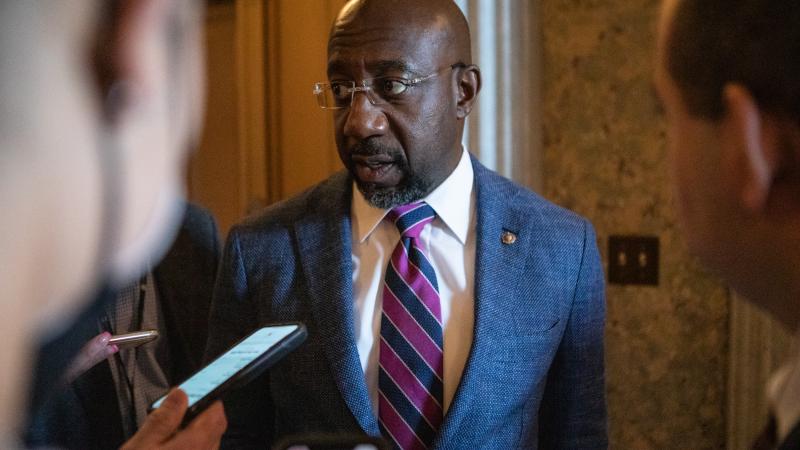Senate bill to end shutdown includes money for members to sue over secretly obtained phone records
The measure follows revelations that phone call data from eight GOP senators was collected as part of investigation by DOJ special counsel Jack Smith.
A provision in the Senate's spending bill to end the government shutdown includes money for members to sue the government if their phone records are investigated without their notice.
The provision appears to be in response to eight Republican senators who had their phone records subpoenaed by Justice Department special counsel Jack Smith in 2023 as part of his investigation into Trump's efforts to overturn the 2020 election.
The Senate measure is now in the House and is expected to pass Wednesday in the GOP-controlled chamber to end the record-long shutdown, now over 40-days long.
If passed, the measure will allow members to sue in federal court for damages of $500,000 or more.
Smith and the FBI reportedly collected the private phone records of eight Republican senators and one GOP House member as part of his investigation into the Capitol riot of January 6, 2021, sparked by the outcome of the 2020 election in which President Trump lost his first reelection bid.
An unearthed FBI record from 2023 indicated that investigators at the bureau had “conducted preliminary toll analysis on limited toll records” tied to phone calls related to GOP Sens. Ron Johnson, R-Wisc.; Lindsey Graham, R-S.C.; Bill Hagerty, R-Tenn.; Josh Hawley, R-Mo.; Dan Sullivan, R-Alaska; Tommy Tuberville, R-Ala.; Cynthia Lummis, R-Wyo.; Marsha Blackburn, R-Tenn.; and GOP Rep. Mike Kelly, R-Pa.
The spending bill states that “any Senator whose Senate data, or the Senate data of whose Senate office, has been acquired, subpoenaed, searched, accessed, or disclosed in violation of this section may bring a civil action against the United States if the violation was committed by an officer, employee, or agent of the United States or of any Federal department or agency.”
The provision says that this applies only to “any acquisition, subpoena, search, accessing, or disclosure of Senate data … and to any failure to disclose such an acquisition, subpoena, search, accessing, or disclosure, occurring on or after January 1, 2022” — suggesting the provision is aimed at those senators targeted by the Biden Justice Department.
The spending bill adds that “if a Senator prevails on a claim under this subsection, the court shall award — for each instance of a violation of this section, the greater of statutory damages of $500,000 or the amount of actual damages.”
"House Republicans are introducing standalone legislation to repeal this provision that was included by the Senate in the government funding bill," House Speaker Mike Johnson, R-La., tweeted on Wednesday. "We are putting this legislation on the fast track suspension calendar in the House for next week."
Senate Judiciary Committee Chairman Chuck Grassley, R-Iowa, first disclosed Smith’s efforts to obtain phone records on Republican members of Congress.
“This document shows the Biden FBI spied on 8 of my Republican Senate colleagues during its Arctic Frost investigation into ‘election conspiracy’ Arctic Frost later became Jack Smith's elector case against Trump,” Grassley said in an October tweet as he shared the FBI record that had been provided to him by current FBI Director Kash Patel. “BIDEN FBI WEAPONIZATION = WORSE THAN WATERGATE.”
Lawyers for Smith defended the client's decision to obtain the phone records.
“His investigative decisions were similarly motivated, and the subpoena for toll records was entirely proper, lawful, and consistent with established Department of Justice policy. While Mr. Smith’s prosecutions of President Trump have predictably been politicized by others, politics never influenced his decision making,” Smith’s lawyers contended. They added that “Mr. Smith’s use of the toll records as Special Counsel was lawful and in accordance with normal investigative procedure.”
The spending bill that has passed the Senate and will likely pass the House and reopen the government appears to clear the way for the Republican senators targeted by Smith to more easily prevail in court by stating that “no officer, employee, or agent of the United States or of any Federal department or agency shall be entitled to assert any form of absolute or qualified immunity as a defense to liability under this subsection.” The bill says that “the United States expressly waives sovereign immunity with respect to actions brought under this subsection.”
Both Democrats and Republicans in the House criticized the spending bill provision, although it was not stripped out of the bill on Tuesday.
House Minority Leader Hakeem Jeffries, D-N.Y., called it a “self-dealing, sick provision.” He argued that “the notion that eight Republican senators — signed off by John Thune and the Republicans apparently in the Senate and the House — would give themselves the ability, essentially, to rip millions of taxpayer dollars away from the American people so they can line their pockets because these people were insurrection sympathizers is insanity.”
Maryland Rep. Jamie Raskin, the top Democrat on the House Judiciary Committee, sent out a statement saying, “the Senate’s Republican Majority Leader, John Thune, just tucked one of the most blatantly corrupt provisions for political self-dealing and the plunder of public resources ever proposed in Congress into the GOP’s spending bill.”
House Appropriations Committee Chairman Tom Cole, R-Okla., was also not thrilled about the provision, although he helped the spending bill pass through the committee.
“Did I know about this provision in the bill? No. Do I think it needs to be in a funding bill? Not particularly,” Cole said on Tuesday according to Politico. “But do I think getting the government open is important? Yes I do.”
Rep. Austin Scott, R-Ga., also said on Tuesday that “I personally agree this should be removed,” according to the Huffington Post. “The problem is, if we remove it, it has to go back to the Senate. … I’ve struggled with what to do. What they did is wrong.”
Rep. Chip Roy, R-Texas, also called the provision “self-serving, self-dealing kind of stuff,” according to the outlet, arguing that “needs to get fixed as soon as possible” but that pulling the provision out of the spending bill would prolong the shutdown.
Recently-declassified revelations related to Arctic Frost chronicle the 2022 expansive lawfare efforts against Trump and MAGA world, as criminal inquiries – which would soon lead to criminal charges – spun into high gear as Trump leaned toward running for president again.
The bill which would end the government shutdown also provides rules on notifying senators if their data is being subpoenaed.
“If any provider for a Senate office receives any legal process seeking disclosure of Senate data of the Senate office that is transmitted, processed, or stored (whether temporarily or otherwise) through the use of an electronic system established, maintained, or operated, or the use of electronic services provided, in whole or in part, by the provider for a Senate office, the provider for a Senate office shall notify the Senate office and, unless specified otherwise by the Senate office, the Office of the SAA [Sergeant-at-Arms] in writing,” the bill says.
The bill adds that if the Office of the SAA receives notice that a senator’s data is being subpoenaed then the Office of the SAA “shall notify a Senate office in writing.”
Smith issued nearly 200 subpoenas in his sweeping Arctic Frost-linked case against President Donald Trump related to the 2020 election and the events of January 6, 2021, seeking records on more than 400 Republican personalities and groups, according to records released by Grassley.
Recent evidence shows that then-FBI Director Chris Wray, then-Attorney General Merrick Garland and then-Deputy Attorney General Lisa Monaco signed off on the launch of the Arctic Frost inquiry into Trump related to the Capitol riot.
Unearthed emails also show that the Biden White House Counsel’s Office coordinated with an FBI agent to hand over phones which had belonged to Trump and Mike Pence, who was Trump's vice president.
Arctic Frost also targeted dozens of GOP officials and organizations, according to documents released earlier this year.













